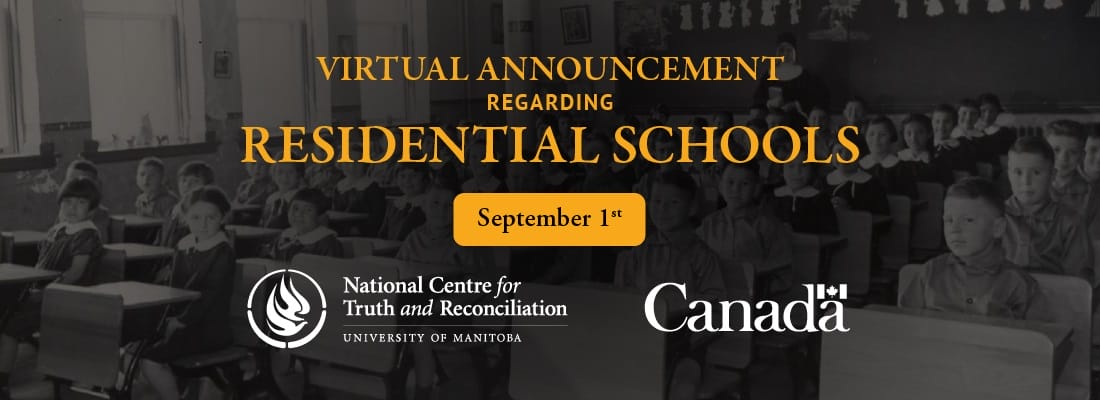Recognition of Historic Significance of the Residential School System and Former Residential Schools Crucial Step on Path to Reconciliation

The National Centre for Truth and Reconciliation (NCTR) welcomes the federal government’s official recognition that tragic harms inflicted through the residential school system are a crucial defining part of Canadian history that must be understood and addressed in the present.
In an online ceremony on September 2, 2020, the NCTR, Parks Canada and the federal Minister of Environment and Climate Change announced that the residential school system is now formally designated as an “event of national historic significance.”
As part of this announcement, two former residential school sites, the former Portage La Prairie Residential School in Manitoba and the Former Shubenacadie Residential School in Nova Scotia, have been designated as National Historic Sites.
These designations are an important step in preserving the collective memory of Canada’s history. It also provides Survivors and communities the ability to receive the support and funding they need to remember and honour the Survivors and the children who never returned home.
Having space where Survivors can be honoured, the children can be remembered, and the past can be acknowledged, can lead to change and healing for our future. Canada has an obligation to create these spaces and opportunities for residential school Survivors, their descendants and their communities to continue to tell their truth.
How to nominate a residential school or site?
Anyone who is interested in potentially nominating a former residential school site or an aspect of residential school history for consideration as an event, site or person of national historic significance can contact the Secretariat of the Historic Sites and Monuments Board of Canada at pc.clmhc-hsmbc.pc@canada.ca.
As per residential school cemeteries, they can only be nominated if it is part of the larger former residential school site. However, the Department of Crown Indigenous Relations (CIRNA) is leading the work on the Calls to Action 72-76 – Missing Children and Burial Information. More information can be found at: Crown-Indigenous Relations and Northern Affairs Canada.
What to expect in the application process?
Communities and Survivors can apply to have a site or the residential school designated. The process for communities to apply for the designation is to connect with Parks Canada (pc.clmhc-hsmbc.pc@canada.ca) and apply. The application process begins when Parks Canada assigns a historian who will develop a report about the site for the community and present it to the Historic Sites and Monuments Board for review (the board reviews applications twice a year).
There is no deadline for communities to apply and there is no one method to commemorate the school or the site. Communities and Survivors decide how the site or school will be remembered.
For eligible nominations pertaining to residential school history, Parks Canada will work with the nominating community to determine the community’s desired level of involvement in the project.
How the NCTR can help?
This announcement begins the next phase in the NCTR’s work with communities. The NCTR will shortly have a program in place for grants and to navigate through Parks Canada’s National Program of Historical Commemoration to commemorate the residential school or the site of the Residential School. The program will include a term Liaison position to aid communities in working with the government and planning events and engagements to aid in the process of commemoration. The NCTR is currently in the process of developing this program.
For more information contact the NCTR@umanitoba.ca, or Phone: 204-474-6069, Toll Free: 1-855-415-4534 (North America)
Why work with the NCTR?
The NCTR can do much more in supporting communities. The NCTR currently works with communities to help with saving and preserving their residential school experiences through statements and any form of remembrance or act of healing.
The NCTR has worked to develop a stewardship relationship collaborating with communities to conserve and save their records. All while ownership, control, and access is under the direction of communities, the NCTR only safeguards and stores them. Indigenous community identity is braided into the NCTR’s materials.
The NCTR Archives represents a disruption with traditional European practices of public libraries and archives because it is guided by Indigenous worldviews and methods for creating, keeping, and sharing valued social memory.
- View the announcement
- More information on the Parks Designation visit
- Sign up for NCTR Newsletter and receive updates on the NCTR Parks Program
